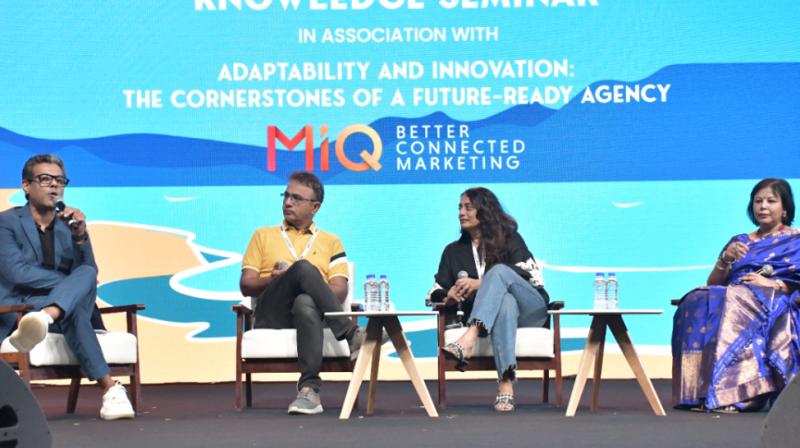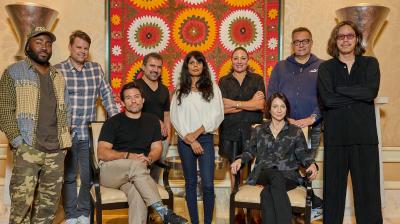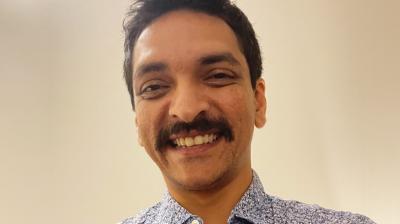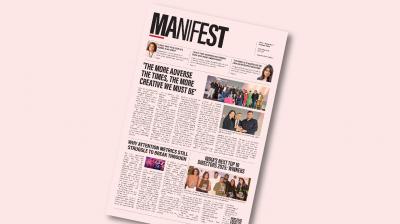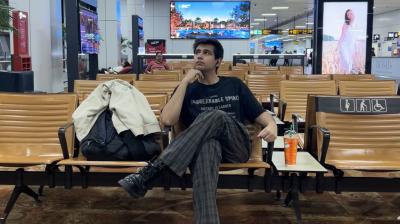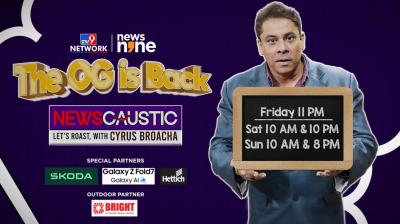How do we give credit to young talent and put them in front? Founders and senior leaders often discuss revenue and talent but rarely address fundamental business problems or the industry's need for change.
In response to this issue, during the last day of Goafest 2024, a panel comprising Anusha Shetty, chairperson and group CEO, Grey Group, India; Jitendar Dabas, chief operating officer and CSO, McCann Worldgroup India, head - effectiveness, McCann Worldgroup APAC; and Babita Baruah, chief executive officer, VML India, emphasised the ad industry's need to adapt to changing demographics and preferences among younger generations.
The session was moderated by Dheeraj Sinha, group CEO, India and South Asia, FCB Group India.
During their discussion, the panel highlighted the urgent need for ad agencies to move away from outdated thinking and models, focusing instead on valuing and empowering young talent.
Adapt to Gen Z workforce needs
Kicking off the session, Dabas discussed the evolving advertising landscape, highlighting the impact of technological advancements and the decentralisation of creativity. He questioned the suitability of the traditional agency model in this new environment.
He shared, "The key question is, does the advertising agency model itself need to change? This change is driven by technology, decentralising the industry and creativity. Attracting younger talent requires moving away from vertical, top-down structures. Talent and technology are now found in smaller towns, beyond traditional structures. Are we creating agencies where younger people feel comfortable, or do we need new structures? This shift demands physical, intellectual, and cultural adaptations."
Shetty remarked on the necessity of adapting to the needs of Gen Z in the workplace. Highlighting that a significant portion of India's population comprises Gen Z, who are now entering the workforce, Shetty addressed the challenges and expectations that come with this demographic shift.
"While senior leaders often wish for a return to traditional office settings, the reality is that the younger workforce desires flexibility. The truth is Gen Z is the larger workforce today, and they don't want to come back; they want flexibility. A study found that 85% of Gen Z wants a hybrid work environment or prefers working remotely," Shetty noted.
She posed the critical question of whether senior leaders are ready to accept this change, emphasising that post-covid life has shifted dramatically, requiring new approaches.
Shetty also touched upon economic uncertainties and changing attitudes toward employment. Unlike previous generations, Gen Z employees are not hesitant to seek better opportunities and demand fair remuneration.
"We need to think very differently for them, considering total benefits and creating wealth. They want wealth; they want a good life and flexibility. Are we adapting enough for them, or are we still trying to mould them into who we are? These are the challenges we must address to navigate the evolving business landscape," she stated.
Hiring and retaining young talent
Talking about inducting talent, Baruah highlighted the importance of effective onboarding and cultural integration in the workplace. She noted that while the industry has some good practices, many have been neglected, leading to a ‘baptism by fire’ for young hires.
"Young people are often put into demanding roles from day one, which can be disheartening when they have ambitions beyond menial tasks. Simple things like setting people up for success, explaining the company's culture, and fostering a sense of belonging are crucial," Baruah explained.
She emphasised the need for young employees to feel proud of their workplace and to understand its values. Baruah also stressed the importance of allowing young employees to express themselves and be heard. She recounted an incident from a recent town hall where a young employee asked a question publicly, which some felt should have been done privately.
"We need to create an environment where asking questions openly is encouraged and respected, even if it's directed at senior leaders," Baruah voiced.
Baruah addressed the need to diversify hiring practices to include skills relevant to today's industry needs. She questioned whether companies are looking beyond traditional skill sets to include those from the tech world and production fields. "Today, there's no difference between mainstream and digital teams; it's all one. We need to ensure that our hiring reflects this reality, so new hires feel they are part of the change happening within the company," she added.
Dabas shared his perspective, noting that at the end of the day, while young people may seem more transactional, their fundamental concerns and decision-making processes are similar to ours when we were their age.
“The key question is whether we are doing the same for them. Another important aspect is creating work environments in agencies where no one feels marginalised or overwhelmed. We must avoid being perceived as a tired industry bogged down by elitist LinkedIn posts. Instead, we should foster a culture that supports and uplifts everyone, ensuring that special events and writing aren't the only highlights,” expressed Dabas.
How can agencies improve value proposition and remuneration models?
Dabas compared the marketing industry to consulting firms, highlighting a key difference: "Consulting firms excel because they emphasise value creation before setting a budget, while marketing is often seen as a cost within organisations.”
This perception, Dabas believes puts agencies in a problematic position.
He added, “We need to shift our approach by presenting the value we create upfront, demonstrating the unique benefits we offer compared to other agencies. This makes it easier for clients to see our worth. We should learn from consulting firms; CEOs are willing to invest if they can see the value. This shift will help our industry improve and be recognised for its true potential."
Shetty underscored the need for a shift in approach regarding remuneration and client interactions.
She said, "We need to move beyond simply fulfilling orders—whether it's an ad, a blog, a website, or a series of posts—and engage in more meaningful conversations with our clients. This involves conducting research before meetings, asking the right questions, forming hypotheses, testing them, and presenting a well-thought-out point of view. Our workforce, which includes many younger individuals, must be trained to adopt this mindset. By doing so, we can elevate our value in the client's eyes, moving away from being purely transactional to being seen as strategic partners, much like consultants. This approach will help us command better remuneration and recognition.”
Shetty noted a prevalent sense of urgency in the industry, with clients demanding quick turnarounds and teams eager to meet deadlines. "As agencies, we're always ready to run and meet timelines, sometimes without pausing to ask why. What are the client's real objectives? By digging deeper and asking the right questions, we might uncover underlying issues or find better solutions. While senior levels have the maturity to push back, this consultative approach should be taught at all levels. Encouraging critical thinking and questioning will help us understand clients better and provide superior solutions, which should be reflected in our pitches and interactions,” she added.
Baruah expressed that a new equilibrium has been established in the industry, one that agencies must come to terms with. She stated, "Our competition today isn't just other people, but also technology. Marketing professionals now have the tools to manage many tasks themselves quickly and efficiently. This raises the question: can we, as agencies, do it better? Do our clients believe we can add value, or do they think they can achieve the same results on their own in a fraction of the time? This situation challenges us to leverage strong strategic planning, creative ideas, and media insights more effectively. However, with margins shrinking and talent becoming scarce, we're losing out on strong thinkers. Agencies face pressure to be agile and cost-effective, often lacking the budgets to hire top talent. To solve this, we must embrace technology to scale our businesses and provide measurable ROI. Today, we can track exactly where advertising budgets are being spent and how they're impacting business growth. We need to shift from focusing solely on brand impact to demonstrating how our efforts contribute to overall business growth. While we don't have all the answers yet, we're moving in the right direction."
Dabas emphasised the importance of maintaining pricing discipline within the industry. "As industries democratise with lower entry barriers, leaders must uphold pricing standards to ensure profitability and prevent a damaging race to the bottom. Undercutting harms quality and sustainability. Industry leaders must collaborate to maintain fair pricing, preserving overall value and integrity,” he noted.
Industry challenges, creativity and talent
He reflected on the lessons from the startup world, highlighting the importance of creativity and innovation. "Creativity is the difference-maker, the multiplier in our dynamic world," he remarked. "The new economy underscores this truth—creativity with a unique perspective is paramount, and we see no change in that.”
Baruah concluded by accentuating the value of creative solutions that demonstrate tangible results for clients and businesses. "When our creative ideas yield effective outcomes, we can justify premium pricing and attract more business opportunities,” she summarised.


